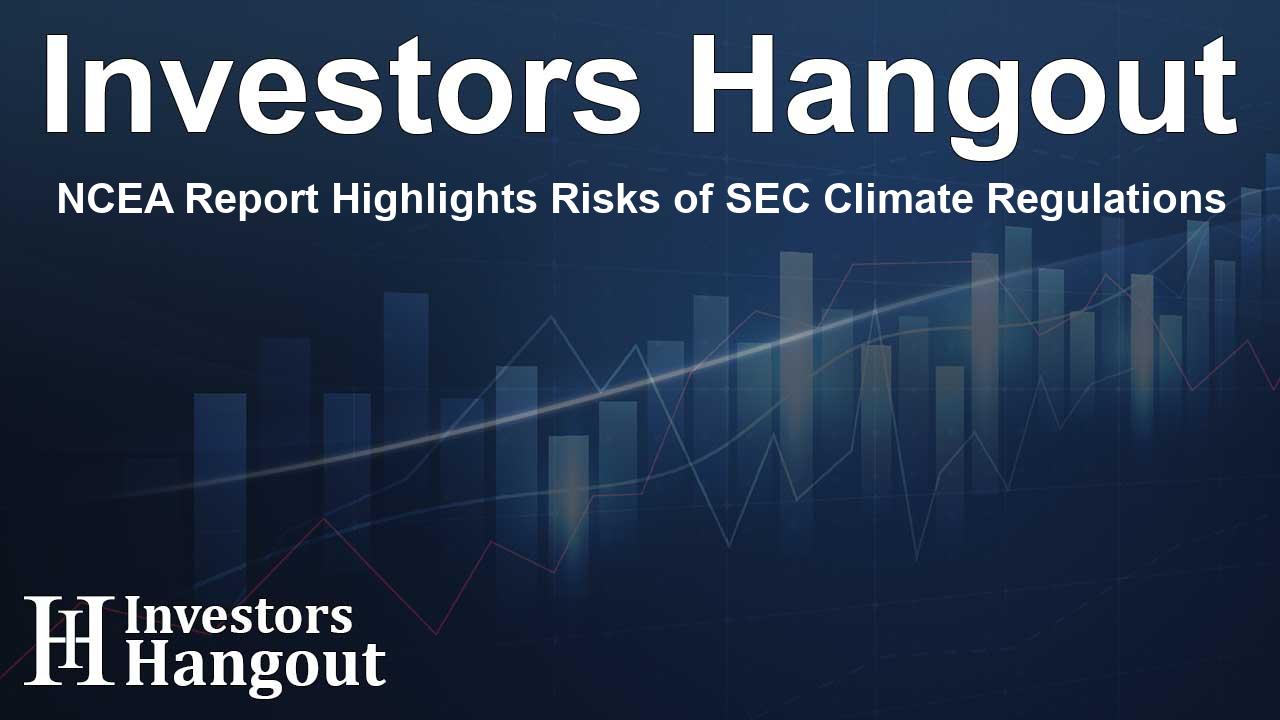NCEA Report Highlights Risks of SEC Climate Regulations

Overview of the National Center for Energy Analytics Report
Today, the National Center for Energy Analytics (NCEA) released an important report assessing how the Securities and Exchange Commission (SEC) climate rules will impact U.S. financial markets. Authored by NCEA Advisor Paul H. Tice, the report outlines a concerning picture of increased regulatory burdens that could jeopardize financial stability.
Key Findings on Regulatory Burdens
Tice's report reveals that the SEC's planned climate regulations could lead to heightened dependence on foreign energy sources. This dependency not only complicates the energy landscape but also makes U.S. financial markets less diverse and more volatile. As competition increases from countries that are not adopting such stringent regulations, the risk of instability in the U.S. economy could escalate.
Increased Market Volatility
The implications of the SEC's actions could result in a financial market that is more susceptible to risks stemming from global energy market fluctuations. By imposing restrictions on fossil fuel markets, Tice provides the argument that these regulations may inadvertently hurt U.S. investors and consumers by distorting the natural operations of the market.
Insights from Influential Advisors
Several prominent figures offered comments on the findings. For instance, Terrence Keeley, NCEA Advisor and chairman of 1PointSix LLC, expressed that environmentalists are circumventing traditional democratic processes through regulatory agencies. He praised Tice for his courage in calling out what he sees as undemocratic actions.
A Call for Informed Energy Policies
Steven Koonin, a Senior Fellow at the Hoover Institution, stressed that Tice's analysis is crucial for anyone involved in the discussion around energy policies and disclosures. He views the SEC's proposed regulations as a subtle move towards a mandatory climate agenda that lacks transparency and accountability.
Analysis of the SEC's March 2024 Climate Rules
The report critically examines the SEC's climate rules issued in March 2024, currently under judicial review. Tice argues that the SEC is overstepping its authority and that the safety and viability of fossil fuels must not be compromised by regulations that are outside its jurisdiction. He highlights how these proposed rules could significantly lessen domestic energy supplies while simultaneously placing the U.S. at a disadvantage compared to countries choosing to embrace fossil fuel usage in their development strategies.
Potential Economic Risks
Tice warns that these rules could expose the U.S. economy to unacceptable risks by designing a framework that discourages investment in the domestic fossil fuel sector. The pressing need for energy independence must be maintained for economic growth, and Tice's findings serve as a reminder of the often overlooked economic realities involved in energy policy.
The Importance of Objective Analysis
Mark P. Mills, Executive Director of NCEA, emphasized the necessity for policymakers to consider the economic implications illustrated in Tice's report carefully. He encourages a balanced approach when enacting any form of energy regulation, highlighting that the potential financial fallout from excessively stringent rules can be far-reaching.
Conclusion and Implications for Future Policy
This report underscores a pivotal moment in U.S. energy policy discussions. As climate policies evolve, understanding their multifaceted economic impacts becomes vital for informed decision-making. The NCEA emphasizes that objective and data-driven analyses are required to guide policies that genuinely support growth and energy security.
Frequently Asked Questions
What is the main focus of the NCEA report?
The report evaluates the SEC climate rules and their potential negative impacts on U.S. financial markets and energy security.
Who authored the report?
The report was authored by Paul H. Tice, an advisor at the NCEA.
What are the potential risks highlighted in the report?
Increased regulatory burdens, market dependency on foreign energy, and heightened market volatility are among the key risks identified.
Why is the report significant for policymakers?
It provides a data-driven analysis of the economic consequences of regulatory actions, guiding more informed decision-making on energy policies.
How does the report view the SEC's role?
The report suggests that the SEC is overstepping its authority with climate rules, which are traditionally the domain of Congress.
About Investors Hangout
Investors Hangout is a leading online stock forum for financial discussion and learning, offering a wide range of free tools and resources. It draws in traders of all levels, who exchange market knowledge, investigate trading tactics, and keep an eye on industry developments in real time. Featuring financial articles, stock message boards, quotes, charts, company profiles, and live news updates. Through cooperative learning and a wealth of informational resources, it helps users from novices creating their first portfolios to experts honing their techniques. Join Investors Hangout today: https://investorshangout.com/
Disclaimer: The content of this article is solely for general informational purposes only; it does not represent legal, financial, or investment advice. Investors Hangout does not offer financial advice; the author is not a licensed financial advisor. Consult a qualified advisor before making any financial or investment decisions based on this article. The author's interpretation of publicly available data shapes the opinions presented here; as a result, they should not be taken as advice to purchase, sell, or hold any securities mentioned or any other investments. The author does not guarantee the accuracy, completeness, or timeliness of any material, providing it "as is." Information and market conditions may change; past performance is not indicative of future outcomes. If any of the material offered here is inaccurate, please contact us for corrections.